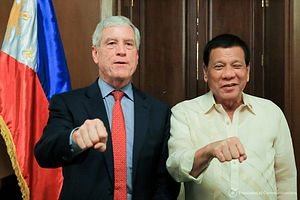Though Philippine President Rodrigo Duterte likes to talk a tough game, he has effectively chickened out of the ASEAN-Australia Summit with his impending nonattendance. And while Duterte officially maintains that he has other domestic issues to attend to – a common excuse given in such instances – it is clear that Duterte is worried about the scrutiny regarding his domestic and international record that could arise in Australia given the attitudes already present about the strongman in the country, particularly among segments of the public and the media.
Officially, Duterte has said his decision not to attend the summit is based on the fact that he has more pressing domestic issues to deal with. But given Duterte’s disregard for multilateralism – evident during the Philippines’ hosting of ASEAN last year – as well as his hot-cold attitude toward Western nations, including Australia, relative to the warmth he displays for China – those excuses rang quite hollow.
It is far more likely that Duterte was simply scared of Australian journalists and politicians who might use the summit as an opportunity to hector him about right issues. There is no shortage of concerns on this front, from extrajudicial killings tied to his so-called war on drugs to his misogynistic and bullying attitudes that have been repeatedly on display in public, including during the election campaign where he joked about the gang-rape of 36-year-old Australian missionary Jacqueline Hamil.
Duterte’s failure to man up and defend his record head on is unsurprising but nonetheless a missed opportunity. For all Duterte’s lack of appreciation, the Australian taxpayer has been a generous contributor to the Philippines for decades. That aid has been for a variety of purposes, including poverty reduction and counterterrorism.
The ASEAN-Australia Summit was an opportunity for Duterte to curry some favor with a wider public and at least say thank you for Australia’s poverty aid reduction program, valued at about $60 million a year, and its military aid program, bolstered and desperately needed in light of Duterte’s sluggish response to the siege of Marawi, which took him by total surprise. That opportunity has now been missed.
But Duterte’s missed opportunity has effects for others as well. Though the Australian media has certainly exaggerated the extent to which this a blow for the government of Australian Prime Minister Malcolm Turnbull, it is nonetheless a setback for the Australian government, which has been emphasizing the value of the summit as an opportunity for engaging with the region’s leaders, including Duterte, for all his faults.
Duterte’s attendance is also a blow for ASEAN itself. Even before the summit, Duterte had become an example of the kind of populist, strongman leader that had further tarnished the record of a regional grouping already facing its own rights concerns. The fact that his nonattendance has dominated the headlines and drowned out stories about a special summit that regional capitals had long been preparing for will no doubt cause a mix of consternation and embarrassment.
But make no mistake: Duterte’s nonattendance at the summit is first and foremost a reflection of his failure to man up and defend his own record. Duterte, like so many strongmen of his ilk, likes to talk a tough game and has bragged about killing people and ordering death. He has also taken to shutting down his critics and publications that annoy him.
But when confronted with the prospect of international scrutiny and embarrassment, Duterte has effectively chickened out. Australian journalists have a well-deserved reputation for being fiercely independent and tough, and Duterte no doubt would prefer not to answer the questions they might have. In backing out rather than confronting these concerns directly, Duterte has only enhanced his own reputation as another strongman who prefers to stay home, where he can control the opposition against him, rather than go abroad where he cannot do so.
Luke Hunt can be followed on Twitter @lukeanthonyhunt
































